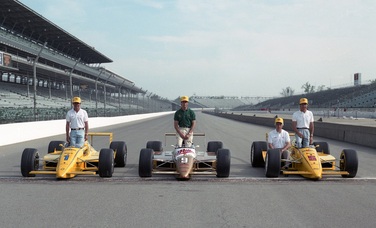Throwback Thursday - 1988 Indianapolis 500 Front Row Sweep
June 16, 2016
As May 1988 approached, so too did Team Penske’s annual trek to the Hoosier State and the hallowed grounds of the Indianapolis Motor Speedway. For team owner Roger Penske, the Brickyard had already been a venue where the automotive mogul had experienced much success. One year earlier, Al Unser Sr. delivered the captain a sixth victory in the historic event, but still there was more to be accomplished as the greatest month of speed in motorsports commenced in Speedway, Indiana.
Qualifying for the Indianapolis 500 is an event within an event. There is only one feeling greater than that of winning the pole for the most prestigious race in the world, that is winning the 500 itself. With Unser Sr. winning the event from the 20th starting position, the deepest starting position of any driver to win the race for Team Penske, it did prove that the front row wasn’t critical to success, but it certainly didn’t hurt.
The 1988 Indianapolis 500 was Team Penske’s 20th anniversary of competing in the event, and the team knew the importance of the race to their owner. Drivers Rick Mears, Al Unser Sr. and Danny Sullivan entered qualifying knowing they would have to contend with wily veteran Mario Andretti as his Lola had shown incredible speed throughout the month of May.
The 1988 season also marked the return of the Penske Chassis, custom built by Nigel Bennett, formerly the Lola’s chief designer. Team Penske had shown speed throughout the month and as Qualifying Day dawned, the three drivers and their cars were set to make history.
As then two-time Indianapolis 500 champion and three-time pole winner Rick Mears sat and watched his teammates turn their four-lap official runs, he knew the competition would be tough, both Sullivan and Unser had placed their Chevrolet powered machines on the front-row, and it was all down to Mears.
Ever clutch, Mears delivered a history making run around the 2.5-mile circuit. On his first lap, the California native turned a lap of 220.453 mph, a lap he would later proclaim far more difficult than his all-time qualifying record (at the time) of 233.934 mph around the Michigan International Speedway. Mears finished his qualifying run with laps of 219.877, 218.781 and 217.702 mph, placing the car affectionately dubbed the Yellow Submarine on the pole position.
Team Penske had made history by placing three cars on the front row for the first time in the history of the Indianapolis 500. For team owner Roger Penske, he described the immense accomplishment as “something you dream about if you have three cars, but the execution is almost impossible.”
Having swept the front row in qualifying, Team Penske turned their collective attention to the pursuit of a seventh Indianapolis 500 in the 72nd running of “The Greatest Spectacle in Racing”.
Race Day
As race day dawned upon the Indianapolis Motor Speedway and the pre-race festivities began, the Captain stressed the importance of a clean start to his three front-row drivers, reminding them that the race couldn’t be won on the first lap of the 500-mile competition, but it could certainly be lost. Not that the three Indianapolis 500 winners needed reminding, they had four victories between them entering the 1988 race.
As the eleven rows of three rounded the Fourth Turn of the Indianapolis Motor Speedway, the green flag was unfurled over the trio of Team Penske Chevrolet’s, as Danny Sullivan darted from the middle of the front row to claim the lead of the race as the field rocketed off into Turn 1. Sullivan would lead two times for 91 total laps on the afternoon.
At Lap 31, Al Unser Sr. took the lead from Sullivan and would lead 12 laps on the afternoon. Unser Sr. would lead late on a cycle of pit stops, however, it was Rick Mears who would once again find his way to the lead at Lap 123 and claim his third victory in the Indianapolis 500.
May of 1988 was a near perfect month for Team Penske as the team raced to a seventh victory in the ‘Greatest Spectacle in Racing’ and accomplished the front row sweep, a feat that no team had accomplished previously and no team has accomplished since.

